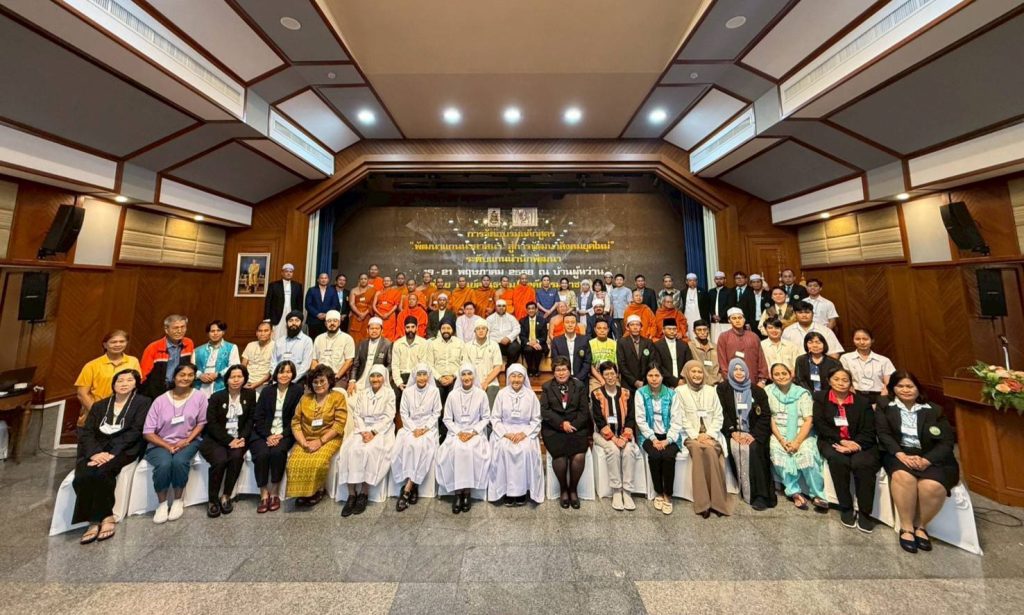Representatives of Thailand’s major religions gathered for a landmark interfaith seminar from May 19 to 21 in the suburbs of Bangkok, focusing on “Training Religious Leaders to Face the Challenges of Modern Society.”
The event was organized by the Ministry of Culture, the Department of Religious Affairs, and the Moral Promotion Center.
The gathering drew 62 representatives from five major religious traditions—Buddhism, Islam, Christianity, Hinduism, and Sikhism—through the collaboration of the Committee for the Promotion of Virtue, religious networks, and key interfaith organizations.
Participants included 20 Buddhist leaders, 18 Muslims, and a notable delegation from Christian and Hindu communities.

The seminar aimed to equip religious leaders with tools to address the moral and social challenges of contemporary Thai society.
In his remarks, Fr. Chalongrat Sankarat, Head of the Commission for Interreligious Dialogue of the Catholic Bishops’ Conference of Thailand (CBCT), emphasized that the seminar’s main goals were to analyze the current moral landscape, identify challenges each religion faces, and explore practical, faith-based solutions.
He noted the importance of deepening understanding of the core principles of each religion and empowering religious leaders to be agents of change in their communities.
Fr. Chalongrat highlighted several key aspects of the seminar, including: strategies for raising new generations of religious heirs who will carry forward their traditions with understanding and commitment; approaches for communicating religious values effectively in the modern age, especially through media and digital platforms; and building interfaith networks and developing information systems to support long-term collaboration.
“Today’s religious leaders must not only preserve tradition but also be visionary guides for the future,” Fr. Chalongrat said. “This means understanding how to communicate virtue and moral principles in ways that resonate with the realities of young people and modern society.”
Ten prominent speakers from various faiths led discussions on religion’s role in fostering peace, development, and ethical living. Sessions included reflections on societal transformation, moral communication, and case studies drawn from community experiences.
Another representative of the Catholic Church was Sr. Kannikar Iamtaisong, SHB, a speaker and a member of the CBCT’s Commission for Interreligious Dialogue.
In an interview with LiCAS News, she shared how the Catholic delegation engaged participants by explaining the papal election process and offering reflections on the inaugural homily of Pope Leo XIV, which included a moving quote from St. Augustine: “Lord, you have made us for yourself, and our heart is restless until it rests in you.”

“We used this quote to explain a universal truth — that every human heart longs for meaning and connection,” Sr. Kannikar said. “It resonated with many participants, even those from different religious backgrounds. One said it felt like something they had always sensed, but never had the words to express.”
To make the concept relatable, Sr. Kannikar offered an analogy: “Think of it like a puzzle piece meant to fit into a larger picture. Until we find our place, we feel incomplete. Augustine’s insight speaks to this universal human experience — the search for belonging, peace, and purpose.”
The Catholic team emphasized that this longing for transcendence is not unique to Christianity but is shared across all religious traditions — a point that fostered meaningful dialogue and mutual understanding.
The seminar ended on a hopeful note, with participants committed to facing the ethical and social challenges of the present age by working together across religious boundaries.
A shared vision emerged: one where religious leaders not only serve as spiritual guides, but also as catalysts for moral renewal, builders of peace, and mentors of the next generation.







